|
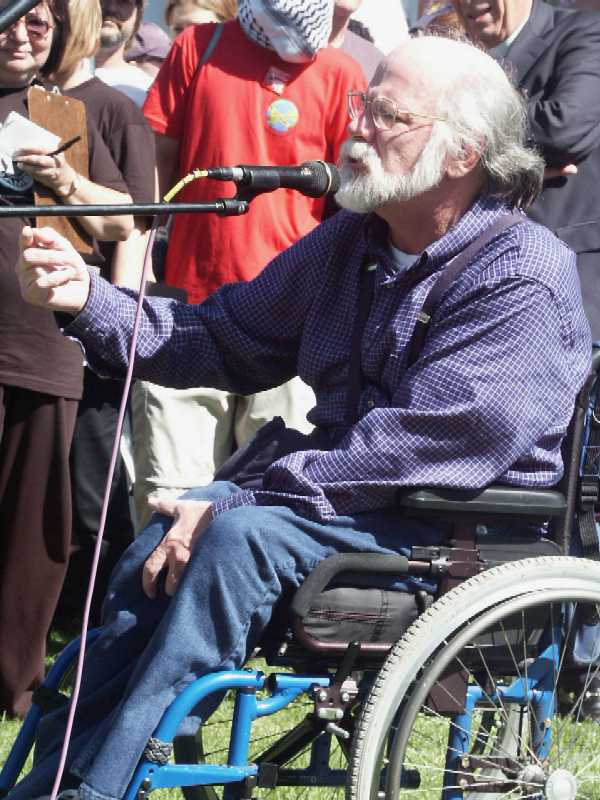
Ron Kovic Reborn
By Tim Gilmer
New Mobility
Monday 23 June 2003
When bad men combine, the good must
associate; else they will fall, one by one." Edmund Burke
~~~~~~~~~~~~~~~~
I am the living death
the memorial day on wheels
I am your yankee doodle dandy
your John Wayne come home
your fourth of july firecracker
exploding in the grave
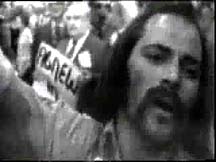
The day Baghdad fell, Ron Kovic was back in the
Veterans Affairs hospital. Not the shameful Bronx VA that
Kovic's 1976 book, "Born on the Fourth of
July," and later, Oliver Stone's academy
award-winning movie of the same name, exposed –
which was subsequently condemned and torn down – but
the Long Beach, Calif., VA hospital. Kovic, 56, had gone
in for a checkup at the spinal cord injury outpatient
clinic, only to find his doctor expressing worry over
potential cutbacks, a situation reminiscent of spending
priorities at the close of the Vietnam War.
"We're putting all of these millions of
dollars into warfare when the disabled of our country,
disabled veterans and disabled citizens, are in need.
Many of them live below the poverty level," says the
man whose life was portrayed onscreen in 1989 by Tom
Cruise. "This policy of aggression, this policy of
arrogance, of blindness, of recklessness, I don't think
this is going to help America. I think that this
behavior, which I abhor, this policy, which I strongly
disagree with, is leading this country in the wrong
direction."
His voice has been shaped by war, its destructive
aftermath and decades of fearless commitment to
protesting governmental policies that support war. To
Kovic, war is not an abstraction, not a neatly packaged
television graphic – The War with Saddam – not
a map bristling with colored pins. It's blood-and-guts
reality, and he owns it. He's a streetwise activist,
"I think this policy is so wrong, and so misguided,
and I may be one of the few Americans saying that right
now, but I believe strongly in what I'm saying, and I'll
say it today, even on this day – [the day Baghdad
fell]. This is a terribly misguided policy that will
backfire, this will not stand, this will not work, this
will work only against us. This will not lead us to peace
and this will not lead us to justice, and this will not
lead us to a safer world but a more dangerous world, a
more dangerous and unstable Middle East. I think this is
going to hurt America."
The Road to Rage
He first spoke out in public against war at
Levittown High School on Long Island, N.Y., in 1969. He
was 23 years old, still adjusting to the T4-6 spinal cord
injury he had sustained in combat in January 1968, still
feeling conspicuous in his wheelchair. It was baptism by
fire. For a Vietnam veteran to speak out against the war
at this time was tantamount to sacrilege, and dangerous:
"All week I had not wanted to go because I had never
spoken in public before, I was very hesitant, and Bob
Muller, who later became the founder of the Vietnam
Veterans of America, had finally convinced me to come
down and join him that day, and I went out on the stage
and there was this bomb threat. We had to evacuate the
auditorium and go out to the grandstands on the football
field. That was quite a beginning for me."
And an even more dramatic turnaround. Kovic had
been a gung-ho Marine who had volunteered to serve a second tour of duty in
Vietnam, a young man whose parents had both served in
World War II, whose uncles had been Marines, who had been
deeply disturbed by growing protests against the war and
who had not hesitated to volunteer for a dangerous
mission the day he was shot. But his experience in the
Bronx VA Hospital opened his eyes. to serve a second tour of duty in
Vietnam, a young man whose parents had both served in
World War II, whose uncles had been Marines, who had been
deeply disturbed by growing protests against the war and
who had not hesitated to volunteer for a dangerous
mission the day he was shot. But his experience in the
Bronx VA Hospital opened his eyes.
"They used to call it the Bronx Zoo. It was
there that I began to wonder why I and the others had
gone to Vietnam in the first place. And whether we had
lost our bodies for nothing. It was in that place going
through the sometimes-abusive conditions that I was
slowly becoming aware and recognizing what had happened.
And I remember seeing all the wounded around me, getting
a full picture, which you never saw, for instance, during
the recent war coverage on CNN or Fox News. You'll never
see what I saw."
What he saw was an understaffed, outdated veterans
hospital teeming with paralyzed bodies, amputees and head
injuries. And why were they being treated like disposable
parts of a machine instead of heroes? The questions
yielded no satisfactory answers, and anger and bitterness
grew in the vacuum. "I'm not ashamed to admit that I
felt enraged," he says.
Not long after leaving the Bronx VA for the second
time, he moved to California, where he was influenced by
author/screenwriter Dalton Trumbo. "I remember
reading his book – 'Johnny Got His Gun' – a
powerful antiwar novel [set in World War I and published
in 1939]. I had just become involved with the vets
against the war, just hesitantly beginning to oppose the
war in 1970-71." Kovic attended the opening of the
movie based on the book, where he met Trumbo and actor
Donald Sutherland. "It was an extraordinary evening,
and I thanked them that night and it was thrilling to
meet Trumbo. He was one of the Hollywood 10, definitely a
man of his conviction, someone I respected." Trumbo,
suspected of having communist ties, was imprisoned for
nearly a year in 1950 for refusing to testify before a
congressional committee, then blacklisted by Hollywood
until the late 1960s. "I really think his book
influenced the very heart and soul of my writing of 'Born
on the Fourth of July.'"
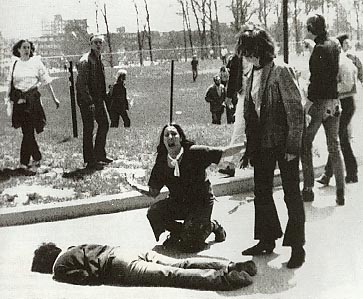 The year prior to the
release of the film version of "Johnny Got His
Gun," National Guardsmen opened fire on a crowd of
Kent State University students protesting the Vietnam
War, killing four and wounding nine. To this day Kovic
maintains a close connection with Kent State students. In
the late 1970s he was arrested for protesting the
desecration of the site of the massacre and has spoken on
campus a number of times, primarily on the anniversary of
the shootings. "I was deeply affected by what
happened on that date," he says, referring to May 4,
1970 – one of the darkest days of the Vietnam era,
on a par with the infamous My Lai massacre. The year prior to the
release of the film version of "Johnny Got His
Gun," National Guardsmen opened fire on a crowd of
Kent State University students protesting the Vietnam
War, killing four and wounding nine. To this day Kovic
maintains a close connection with Kent State students. In
the late 1970s he was arrested for protesting the
desecration of the site of the massacre and has spoken on
campus a number of times, primarily on the anniversary of
the shootings. "I was deeply affected by what
happened on that date," he says, referring to May 4,
1970 – one of the darkest days of the Vietnam era,
on a par with the infamous My Lai massacre.
As if witnessing this kind of
government-sanctioned madness weren't enough, Kovic had
to deal with his own personal My Lai – his platoon
had killed innocent villagers. Babies. And then there was
the young corporal from Georgia, who Kovic accidentally
shot and killed in a chaotic firefight.
Add to this the allure of fate: The most important
dates in Kovic's life coincided with two of his country's
most important historic dates. Most people know the
significance of his birthdate from his book or Stone's
movie, but many do not know that he was shot and
paralyzed, in effect reborn as a paralyzed vet, the same
day Martin Luther King Jr. celebrated his last birthday.
He would later choose King as his model for nonviolent
protest in the streets.
That Kovic's birthday falls on the same day his
country celebrates the birth of democracy. As a  child, year after year he
celebrated Independence Day as the high point of his
life: "We'd eat lots of ice cream and watermelon and
I'd open up all the presents and blow out the candles on
the big red, white and blue birthday cake," he
writes in his book, "and then we'd all sing 'Happy
Birthday' and 'I'm a Yankee Doodle Dandy.'" The same
kids who attended his birthday party played make-believe
war with him in the woods on the outskirts of Massapequa,
a small town on Long Island. "I grew up with
Sergeant Rock comic books and John Wayne in 'Sands of Iwo
Jima' and Audie Murphy [decorated war hero-turned-actor]
in 'To Hell and Back.' I had grown up with a strong
conditioning concerning the military." child, year after year he
celebrated Independence Day as the high point of his
life: "We'd eat lots of ice cream and watermelon and
I'd open up all the presents and blow out the candles on
the big red, white and blue birthday cake," he
writes in his book, "and then we'd all sing 'Happy
Birthday' and 'I'm a Yankee Doodle Dandy.'" The same
kids who attended his birthday party played make-believe
war with him in the woods on the outskirts of Massapequa,
a small town on Long Island. "I grew up with
Sergeant Rock comic books and John Wayne in 'Sands of Iwo
Jima' and Audie Murphy [decorated war hero-turned-actor]
in 'To Hell and Back.' I had grown up with a strong
conditioning concerning the military."
In 1972, protesting with other Vietnam vets at
President Richard M. Nixon's campaign headquarters on
Wilshire Boulevard in Los Angeles, he was thrown from his
chair and kicked, then jailed – by undercover police
pretending to be protesting war veterans. That same year
at the Republican National Convention in Miami, while
attempting to shout down Nixon, he and other veterans
against the war were forcibly removed from the convention
hall. Moments later, a man who would later become the
first president of the United States to resign rather
than be removed from office because of criminal activity
smiled and waved to supporters amid chants of "Four
more years! Four more years!"
Little wonder – when all these influences are
combined – that Kovic's autobiography –
published on the 200th anniversary of the nation –
opens with his darkly ironic poem: 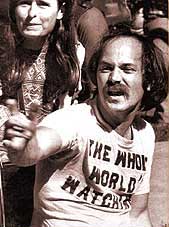
- I am the living death
- the memorial day on wheels
- I am your yankee doodle dandy
- your John Wayne come home
- your fourth of july firecracker
- exploding in the grave
As a political figure, Kovic's star ascended to
the heights of national recognition at the 1976
Democratic National Convention, where he spoke to the
delegates. His journey to the national platform had not
taken him through the usual political pathways. He had
earned his credentials from years of protesting in the
streets and speaking out against the war.
He returned to the Democratic National Convention
as a delegate for Jesse Jackson in 1988. Over the next
three years he co-wrote the film version of "Born on
the Fourth of July," receiving a Golden Globe (on
the anniversary of his having been wounded) for best
screenplay along with Oliver Stone – who also won an
Academy Award for best director – and spoke out
against the Gulf War, giving numerous speeches, press
conferences and interviews, including an appearance on
"The Larry King Show." And of course, he
brought his protest to the streets.
Why did he always return to the path of civil
disobedience? "There was a certain amount of
distrust after I came home from the war, a certain
distrust of the system," he says. "And I think
there was a part of me that would always – as it is
with many combat veterans – have a difficult time
trusting this government. But I had a lot of faith in
people like my mother and father, decent working people,
and I had a lot of faith in grassroots politics, and I
really believed that I could contribute the most by
working outside the system."
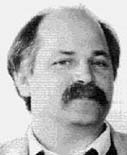 There was a moment
when he considered becoming a candidate. "I was
asked to run for office by many people after the movie
came out. I was asked to run against Robert Dornan in
Orange County. I was on his television show twice –
it was quite controversial, it was a shouting match, it
was quite uncomfortable, and that was the closest I came
to ever running. But I made a decision, and I'm glad I
chose not to run. I've always wanted to work outside of
the political process. I've had a very political life,
I've met people across the political spectrum and I've
tried to speak from my heart – and speak as freely
as possible." There was a moment
when he considered becoming a candidate. "I was
asked to run for office by many people after the movie
came out. I was asked to run against Robert Dornan in
Orange County. I was on his television show twice –
it was quite controversial, it was a shouting match, it
was quite uncomfortable, and that was the closest I came
to ever running. But I made a decision, and I'm glad I
chose not to run. I've always wanted to work outside of
the political process. I've had a very political life,
I've met people across the political spectrum and I've
tried to speak from my heart – and speak as freely
as possible."
In the fall of 2002, when talk of war with Iraq
took a serious turn, Kovic again found his voice. "The
true purveyor of terror [is] the government in
Washington, D.C.," he told a crowd of
antiwar marchers he had led to the Army Reserve Center in
Santa Monica, Calif., on Oct. 6 – the first
anniversary of the beginning of the bombing of
Afghanistan. Armed with a bullhorn, Kovic exhorted
National Guardsmen and trainees to lay down their weapons
and join the new peace movement. Earlier, addressing the
protesters, many of whom were UCLA students, Kovic called
the rally "the greatest class in democracy you
can take."
On Oct. 26, elaborating on his vision of a
populist antiwar uprising, Kovic flirted with hyperbole
in addressing a huge crowd of protesters in San
Francisco: "This is the most important moment
in American history. You are a part of an extraordinary
moment in the turning of the history of this country. You
will take this government back on behalf of the people of
the United States." Invoking his idol, King,
he went on to advocate nonviolent protest, placing blame
for the terrorist threat squarely at the feet of the Bush
administration. "The leaders, the president
... they are the ones who have brought on Sept. 11. It is
their violence that brought the violence to our nation,
and it's their violence that we must stop and stop
forever."
With the protest movement growing and
hundreds of thousands expected to march Jan. 18 in
Washington, D.C., Kovic spoke with CNN's Wolf Blitzer.
The interview was posted on cnn.com: "I very much
care about this country. ... This is a weekend that has a
lot of significance to me personally. In the spirit of
Dr. Martin Luther King, in the spirit of nonviolence, not
violence, not war, but in the spirit of nonviolence,
we'll be marching with dignity in great numbers all over
this country. This is a movement, a peace movement that
is going to become a citizens' protest movement unlike
... any movement or protest movement ever seen before in
this country."
The next day Kovic was quoted on the "BBC
News Online" as saying the new peace movement
represented a "revolutionary transformation" in
this country that was as important as the Revolutionary
War of 1776, once again linking his political life to the
nation's birth. However, the demonstrations of Jan. 18
may have been the high point of the movement. Hundreds of
thousands marched in Washington, D.C., San Francisco, Los
Angeles, London, Paris and around the world, but from
this day forward, the number of protesters in the United
States began to diminish.
Still, demonstrations continued right up to the
day U.S. forces invaded Iraq, and Kovic remained in the
thick of it. "We will do everything we can in the
streets of this country to bring the troops back
immediately," he told a rain-drenched crowd in Los
Angeles on March 15, just days before the war began.
"We have much respect for them, and we don't want
them to be used the way my 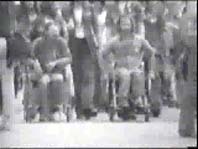 generation
was." generation
was."
Once U.S. troops drove into Iraqi territory, the
mood of the country changed, but Kovic's resolve remained
constant. "When the war began there was this whole
mentality, this whole conformist mentality to get with it
now, no reason to protest, and I absolutely dismissed
that. We would not have stopped the Vietnam War if we had
not been protesting for many years after the war had
already begun." On March 30, with the war in full
swing, Kovic told another Los Angeles crowd of
protesters: "Many of the people who are architects
of the war haven't experienced war as I did. They're ...
risking the lives of the beautiful men and women that are
our troops. It's shameful."
The day Baghdad fell, April 9, just three weeks
into the war, it seemed to outsiders that the new peace
movement had barely lifted off the ground. Looking back,
did Kovic see what others saw, that no one seemed to be
listening? Was the outcome disappointing? "I've
never been more optimistic," he says . "I think
this is the beginning. I firmly believe this is going to
be the beginning of the changing of this country."
What changes does he foresee? "The awakening of a
new democracy, a participatory democracy like none we've
seen before. I want this to be a country that understands
that its citizenship has not only to do with loving this
country, but also building bridges of friendship and
respect to other cultures and people throughout the
world."
Victim or Victorious?
Kovic's priorities, drawn from his war experience,
are clear. He has produced nearly 1,000 paintings over
the years, donating the proceeds mostly to homeless
veterans. "Yes," he says, "to benefit the
homeless – almost on all occasions – homeless
veterans. I've never sold the art for my own personal
gain. If I've auctioned it, I've auctioned it in Chicago,
San Francisco and here in L.A., for the homeless."
He may not be in the forefront of the fight for
disability rights, but the beginning of his life as a
wheelchair user coincides with the birth of seminal
disability legislation – 1968, the year the
Architectural Barriers Act was passed – and he knows
where the movement is headed. In July 2000, on the 10th
anniversary of the passage of the ADA, Kovic spoke at a
celebration sponsored by the Coalition for a Santa Monica
Disabilities Commission. Reporting on the event for the
Santa Monica Mirror, Hannah Heineman writes, quoting
Kovic: "'There's been talk throughout the country
[of] watering down' the ADA because it gives the [more
than] 43 million Americans with physical and emotional
disabilities 'too much.' He urged the crowd at the
celebration to oppose modifications in the act because
'we [the disabled] have been allowed to sit at the table
of equality in America and we like it.'"
A Man of Ideals
At heart, Kovic remains idealistic, a remarkable
state of mind for a man who was paralyzed in a war he
later came to abhor, a man who has been beaten, spat
upon, and jailed several times while invoking his right
– as an American citizen – to demonstrate in
protest. Ironically, at times he sounds like a
wet-behind-the-ears candidate, someone who has yet to
experience the hard realities of politics, or life:
"I believe in democracy – an authentic
democracy where all the people are represented – and
I want to be a part of that, I want to be a part of the
continuation of that great democratic experiment. I want
to expand our democracy, I want to make it more and more
authentic, I want people to be encouraged to speak their
minds and not to be afraid or be intimidated."
Why, then, didn't he support the military's
mission to free Iraq from decades of fear and oppression
by Saddam Hussein and the Baath Party? Doesn't he see the
inconsistency in opposing a war to "free the Iraqi
people" while campaigning for a "true"
democracy here in America? "No, I don't at all. I
think what the military has done is sow the seeds of
discontent all throughout the Middle East. I think that
we really were denied a lot of what was happening during
that war by our media. We weren't able to see all of the
civilian wounded, the many casualties that occurred, and
most of the Arab world was seeing that. This war has
caused a tremendous amount of anger, a tremendous amount
of rage against this country. And I'm offended by that.
I'm offended by what this administration and this
president have done to our name. Now they may be telling
us that we're freeing the Iraqis, but I truly believe in
my heart that President Bush has established – with
the use of brutality and force and violence – a
colony, an American colony in the Middle East. I think
it's shameful."
Kovic's assessment of the Bush administration's
motives does not stop with allegations of colonialism.
The real prize, he says, lies beneath the desert sands.
"I don't think that they will ever allow a
democratic government, because a democratic government
would be a direct threat to the very reason they went
over there to begin with, and that is to dominate the
oil, to control that region, and to literally steal the
resources of that region for this administration, for the
corporations and the businesses of our country. That is a
crime."
Working outside the system while seeking to
influence public opinion and governmental policy has
never been easy, but this latest campaign for peace has
been particularly draining on Kovic. If his life were to
be made into a movie today, Tom Cruise could no longer
play the part. It would take an older actor, someone
whose make-up would neatly transform him into Kovic's
image – bald, with a fringe of white hair and a
beard to match. "This is hard what I do, this is
tiring, it's exhausting," he says. "I've been
right in front and I've been speaking in many places, and
I've been speaking with a tremendous amount of passion.
It can make a person weary. I've given everything I
have."
When civil order has returned to Iraq and a new
government is in place, will he continue to speak out in
protest? More than likely. But his chosen form of
expression may change. He has plans to return to what
launched his career as a public figure: "I have to
remind you and others that I'm also an author and a
writer and I have a love of the language. There are many
ways to communicate my politics, whether it's a motion
picture or the writing of a book or speaking behind a
microphone in a rally. I want to move into writing
another book, a book that I actually was beginning just
before Sept. 11 happened."
Kovic's lifestyle will most likely not stand in
the way of his plans. He lives alone in a Redondo Beach,
Calif., apartment and has never married. "Would I
like to get married someday?" he asks, anticipating
the question. "Yes I would, still. But that's been a
struggle, it's been a challenge."
On July 4, 2003, when America marks its 227th
birthday, Ron Kovic – whether he celebrates his own
birthday in the company of friends or alone with his
thoughts – will once again ponder the meaning of his
personal journey. He will take stock of the man he once
was and the man he has become. And he will consider the
legacy he leaves, personal as well as political. "I
want to be a 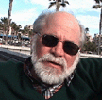 voice, I want to be
able to say I did something with my life, in all aspects:
I learned to make love, I learned to accept my body and
feel comfortable with myself, I learned to move about in
this society and feel a part of it. I did something with
my life, and I was able to help others along the
way." voice, I want to be
able to say I did something with my life, in all aspects:
I learned to make love, I learned to accept my body and
feel comfortable with myself, I learned to move about in
this society and feel a part of it. I did something with
my life, and I was able to help others along the
way."
Mr. Kovic contributed this letter for the American
people to the MY HERO web site on Sept. 14, 2001.
Dear Friends,
My heart and soul weeps with everyone in America right
now. I was deeply saddened by the terrible tragedy that
occurred on Sept. 11, 2001. I didn't sleep much
again last night, as it's been for me, and I'm sure so
many others since Tuesday. I wonder if we will ever sleep
"normally" again? I have thought about it a lot
and I am deeply disheartened by the blind patriotism,
hatred and desire for revenge that I see growing more and
more in this country each day. Resorting to violence and
warfare is a great mistake. The painful anguish resulting
from this senseless act of violence stirs in all of us a
desire for swift retribution. I strongly believe that to
move in this direction will lead us into a terrible and
disastrous war which we, as a people and a nation, may
never recover from. It is a dark and dangerous time in
America, and I, in good conscience, will never support
such an act of madness! We seem to have learned nothing
from Vietnam, and those of us who have come to understand
through great suffering the awful waste and deep
immorality of war, are not being listened to. Those of us
who have found that love and forgiveness are more
powerful than hatred are not being heard. We remain
invisible, isolated and alone, voices in the wilderness
in a country that has truly gone mad. I encourage all of
you to raise your voices on behalf of peace and
non-violence everywhere. I love this country so much that
I don't want to see it go through the senselessness and
agony of war ever again.
With love and a sincere hope for peace!
Ron Kovic
"Peace
cannot be achieved through violence, it can only be
attained through understanding."
Albert Einstein
|



 to serve a second tour of duty in
Vietnam, a young man whose parents had both served in
World War II, whose uncles had been Marines, who had been
deeply disturbed by growing protests against the war and
who had not hesitated to volunteer for a dangerous
mission the day he was shot. But his experience in the
Bronx VA Hospital opened his eyes.
to serve a second tour of duty in
Vietnam, a young man whose parents had both served in
World War II, whose uncles had been Marines, who had been
deeply disturbed by growing protests against the war and
who had not hesitated to volunteer for a dangerous
mission the day he was shot. But his experience in the
Bronx VA Hospital opened his eyes.  The year prior to the
release of the film version of "Johnny Got His
Gun," National Guardsmen opened fire on a crowd of
Kent State University students protesting the Vietnam
War, killing four and wounding nine. To this day Kovic
maintains a close connection with Kent State students. In
the late 1970s he was arrested for protesting the
desecration of the site of the massacre and has spoken on
campus a number of times, primarily on the anniversary of
the shootings. "I was deeply affected by what
happened on that date," he says, referring to May 4,
1970 – one of the darkest days of the Vietnam era,
on a par with the infamous My Lai massacre.
The year prior to the
release of the film version of "Johnny Got His
Gun," National Guardsmen opened fire on a crowd of
Kent State University students protesting the Vietnam
War, killing four and wounding nine. To this day Kovic
maintains a close connection with Kent State students. In
the late 1970s he was arrested for protesting the
desecration of the site of the massacre and has spoken on
campus a number of times, primarily on the anniversary of
the shootings. "I was deeply affected by what
happened on that date," he says, referring to May 4,
1970 – one of the darkest days of the Vietnam era,
on a par with the infamous My Lai massacre.  child, year after year he
celebrated Independence Day as the high point of his
life: "We'd eat lots of ice cream and watermelon and
I'd open up all the presents and blow out the candles on
the big red, white and blue birthday cake," he
writes in his book, "and then we'd all sing 'Happy
Birthday' and 'I'm a Yankee Doodle Dandy.'" The same
kids who attended his birthday party played make-believe
war with him in the woods on the outskirts of Massapequa,
a small town on Long Island. "I grew up with
Sergeant Rock comic books and John Wayne in 'Sands of Iwo
Jima' and Audie Murphy [decorated war hero-turned-actor]
in 'To Hell and Back.' I had grown up with a strong
conditioning concerning the military."
child, year after year he
celebrated Independence Day as the high point of his
life: "We'd eat lots of ice cream and watermelon and
I'd open up all the presents and blow out the candles on
the big red, white and blue birthday cake," he
writes in his book, "and then we'd all sing 'Happy
Birthday' and 'I'm a Yankee Doodle Dandy.'" The same
kids who attended his birthday party played make-believe
war with him in the woods on the outskirts of Massapequa,
a small town on Long Island. "I grew up with
Sergeant Rock comic books and John Wayne in 'Sands of Iwo
Jima' and Audie Murphy [decorated war hero-turned-actor]
in 'To Hell and Back.' I had grown up with a strong
conditioning concerning the military." 
 There was a moment
when he considered becoming a candidate. "I was
asked to run for office by many people after the movie
came out. I was asked to run against Robert Dornan in
Orange County. I was on his television show twice –
it was quite controversial, it was a shouting match, it
was quite uncomfortable, and that was the closest I came
to ever running. But I made a decision, and I'm glad I
chose not to run. I've always wanted to work outside of
the political process. I've had a very political life,
I've met people across the political spectrum and I've
tried to speak from my heart – and speak as freely
as possible."
There was a moment
when he considered becoming a candidate. "I was
asked to run for office by many people after the movie
came out. I was asked to run against Robert Dornan in
Orange County. I was on his television show twice –
it was quite controversial, it was a shouting match, it
was quite uncomfortable, and that was the closest I came
to ever running. But I made a decision, and I'm glad I
chose not to run. I've always wanted to work outside of
the political process. I've had a very political life,
I've met people across the political spectrum and I've
tried to speak from my heart – and speak as freely
as possible."  generation
was."
generation
was."  voice, I want to be
able to say I did something with my life, in all aspects:
I learned to make love, I learned to accept my body and
feel comfortable with myself, I learned to move about in
this society and feel a part of it. I did something with
my life, and I was able to help others along the
way."
voice, I want to be
able to say I did something with my life, in all aspects:
I learned to make love, I learned to accept my body and
feel comfortable with myself, I learned to move about in
this society and feel a part of it. I did something with
my life, and I was able to help others along the
way."